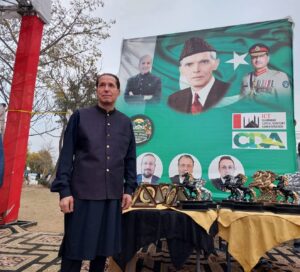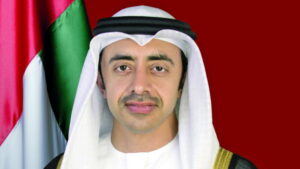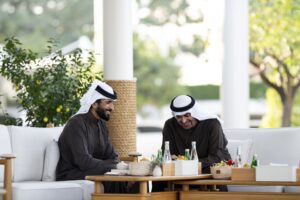UAE and Pakistan Deepen Strategic Ties at 12th Joint Ministerial Commission Meeting in Abu Dhabi

Abu Dhabi, The Gulf Observer: His Highness Sheikh Abdullah bin Zayed Al Nahyan, Deputy Prime Minister and Minister of Foreign Affairs of the United Arab Emirates, received Mohammad Ishaq Dar, Deputy Prime Minister and Minister of Foreign Affairs of the Islamic Republic of Pakistan, during the 12th session of the UAE-Pakistan Joint Ministerial Commission held in Abu Dhabi.
During the session, Sheikh Abdullah and Minister Ishaq Dar reviewed the strong bilateral relations between the two nations and explored ways to deepen cooperation across various sectors to serve mutual interests and enhance prosperity and well-being for both peoples.
Following the discussions, the two sides signed the minutes of the 12th session of the Joint Ministerial Commission, reaffirming their commitment to advancing the UAE-Pakistan strategic partnership.
In a significant development, Sheikh Abdullah and his Pakistani counterpart signed a Memorandum of Understanding (MoU) on the mutual exemption of entry visa requirements for holders of ordinary passports, further facilitating people-to-people ties and enhancing travel between the two countries.
Additionally, both leaders witnessed the signing of two key MoUs:
- One concerning the establishment of a joint task force to promote UAE investments in strategic sectors in Pakistan, signed by Mohamed Hassan Al Suwaidi, UAE Minister of Investment, and Tariq Bajwa, Special Assistant to the Prime Minister of Pakistan.
- Another agreement focused on cooperation in artificial intelligence and the digital economy, signed by Minister Al Suwaidi and Zarar Hashim Khan, Federal Secretary of Pakistan’s Ministry of Information Technology and Telecommunications.
The Joint Ministerial Commission meeting was attended by several senior officials from both sides. Representing the UAE were Mohamed Hassan Al Suwaidi; Ahmed Ali Al Sayegh, Minister of State; Saeed Mubarak Al Hajeri, Assistant Foreign Minister for Economic and Trade Affairs; Omran Sharaf, Assistant Foreign Minister for Advanced Science and Technology; and Hamad Obaid Al Zaabi, UAE Ambassador to Pakistan.
The UAE delegation was chaired by Minister Ahmed Ali Al Sayegh, while the Pakistani side was led by Tariq Bajwa.
In his address, Al Sayegh underscored the significance of the Joint Ministerial Commission as a testament to the long-standing and deep-rooted partnership between the UAE and Pakistan, forged since the establishment of diplomatic ties in 1971.
He praised Minister Ishaq Dar for his dedication to enhancing bilateral relations and highlighted that non-oil trade between the two countries exceeded US$8.6 billion in 2024—a clear indication of their growing economic partnership.
Al Sayegh concluded by emphasizing that the UAE and Pakistan share over five decades of cooperation built on mutual trust and shared objectives, reaffirming their joint commitment to a prosperous and forward-looking future for the benefit of both nations and generations to come.


